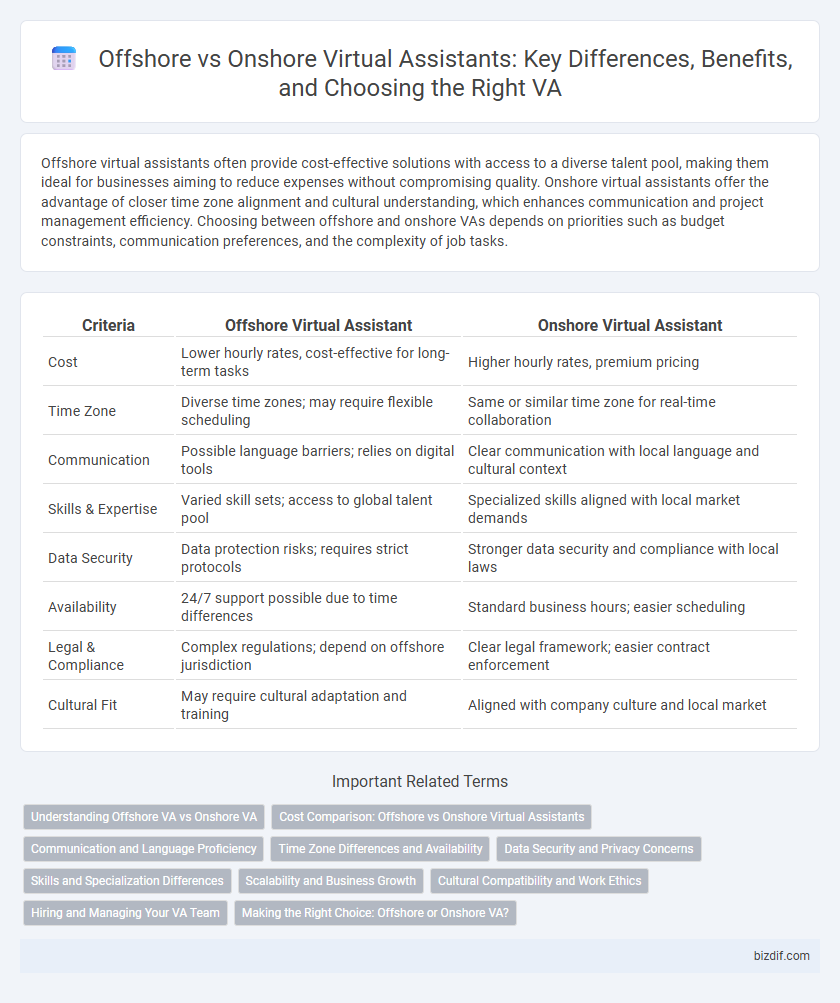Offshore virtual assistants often provide cost-effective solutions with access to a diverse talent pool, making them ideal for businesses aiming to reduce expenses without compromising quality. Onshore virtual assistants offer the advantage of closer time zone alignment and cultural understanding, which enhances communication and project management efficiency. Choosing between offshore and onshore VAs depends on priorities such as budget constraints, communication preferences, and the complexity of job tasks.
Table of Comparison
| Criteria | Offshore Virtual Assistant | Onshore Virtual Assistant |
|---|---|---|
| Cost | Lower hourly rates, cost-effective for long-term tasks | Higher hourly rates, premium pricing |
| Time Zone | Diverse time zones; may require flexible scheduling | Same or similar time zone for real-time collaboration |
| Communication | Possible language barriers; relies on digital tools | Clear communication with local language and cultural context |
| Skills & Expertise | Varied skill sets; access to global talent pool | Specialized skills aligned with local market demands |
| Data Security | Data protection risks; requires strict protocols | Stronger data security and compliance with local laws |
| Availability | 24/7 support possible due to time differences | Standard business hours; easier scheduling |
| Legal & Compliance | Complex regulations; depend on offshore jurisdiction | Clear legal framework; easier contract enforcement |
| Cultural Fit | May require cultural adaptation and training | Aligned with company culture and local market |
Understanding Offshore VA vs Onshore VA
Offshore virtual assistants (VAs) are located in different countries and offer cost-effective services due to lower labor costs, while onshore VAs operate within the same country, providing easier communication and cultural alignment. Understanding the key differences in time zones, language proficiency, and legal regulations helps businesses decide which type of VA best fits their operational needs. Evaluating factors such as budget constraints, required skill sets, and desired level of oversight is essential for optimizing productivity and collaboration with either offshore or onshore VAs.
Cost Comparison: Offshore vs Onshore Virtual Assistants
Offshore virtual assistants typically offer lower hourly rates compared to onshore VAs due to differences in living costs and economic conditions. Onshore virtual assistants usually command higher wages but provide benefits such as easier communication and cultural alignment. Businesses must weigh the cost savings of offshore VAs against potential challenges in time zone coordination and language barriers when considering their virtual assistant options.
Communication and Language Proficiency
Offshore virtual assistants often offer cost-effective services but may face challenges in communication due to language barriers and differences in time zones. Onshore virtual assistants typically provide stronger language proficiency and clearer communication, ensuring seamless collaboration and quicker response times. Prioritizing language skills and cultural understanding is essential for effective virtual assistance and reducing misunderstandings.
Time Zone Differences and Availability
Offshore virtual assistants offer cost-effective support but may face challenges due to significant time zone differences, impacting real-time communication and immediate availability. Onshore virtual assistants align closely with local business hours, ensuring seamless collaboration and prompt responses during critical working periods. Choosing between offshore and onshore VAs depends on prioritizing either round-the-clock coverage or synchronized availability for your specific operational needs.
Data Security and Privacy Concerns
Offshore virtual assistants often present increased data security and privacy concerns due to differing international regulations and potential vulnerabilities in cross-border data transfers. Onshore virtual assistants typically adhere to stricter data protection laws like GDPR or CCPA, ensuring higher compliance and reducing risks of unauthorized access or breaches. Choosing an onshore VA can provide stronger control over sensitive information, mitigating risks associated with offshore outsourcing.
Skills and Specialization Differences
Offshore virtual assistants often excel in specialized technical skills such as coding, graphic design, and data analysis due to access to diverse global talent pools, while onshore virtual assistants typically offer stronger industry-specific knowledge and cultural alignment for businesses. Language proficiency and time zone compatibility can influence the effectiveness of communication and project management between offshore and onshore VAs. Companies seeking cost-effective solutions with advanced technical capabilities may prefer offshore VAs, whereas those requiring nuanced understanding of local regulations and market trends might opt for onshore support.
Scalability and Business Growth
Offshore virtual assistants offer greater scalability by providing access to a larger pool of talent at lower costs, enabling businesses to quickly expand their support teams without significant financial strain. Onshore virtual assistants, while typically more expensive, provide closer cultural alignment and faster communication, which can enhance operational efficiency and business growth in markets requiring high-touch customer interaction. Choosing between offshore and onshore VAs depends on balancing cost-effectiveness with the need for seamless, high-quality service to drive scalable growth.
Cultural Compatibility and Work Ethics
Offshore virtual assistants often bring diverse cultural perspectives but may face challenges aligning with the client's specific work ethics and communication styles due to geographical and cultural differences. Onshore virtual assistants typically exhibit stronger cultural compatibility and a better understanding of local business practices, enhancing seamless collaboration and productivity. Employers prioritizing close alignment with company values and immediate responsiveness often prefer onshore VAs for these reasons.
Hiring and Managing Your VA Team
Hiring an offshore virtual assistant (VA) offers cost-effective access to a diverse talent pool skilled in specialized tasks, while onshore VAs provide easier communication and cultural alignment, enhancing workflow efficiency. Managing an offshore VA team requires clear expectations, robust project management tools, and regular check-ins to overcome time zone differences and language barriers. Onshore VAs benefit from streamlined collaboration and faster response times, simplifying management and ensuring alignment with business goals.
Making the Right Choice: Offshore or Onshore VA?
Choosing between an offshore and onshore virtual assistant depends on key factors such as cost efficiency, time zone alignment, and communication preferences. Offshore VAs often provide significant cost savings and around-the-clock support, while onshore VAs offer easier collaboration and cultural familiarity. Evaluating your business needs for budget, responsiveness, and language proficiency ensures making the right choice for enhanced productivity.
Offshore VA vs Onshore VA Infographic

 bizdif.com
bizdif.com